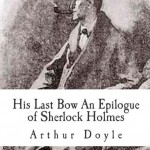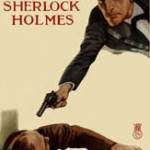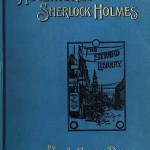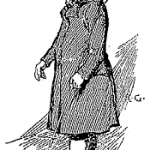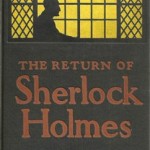Caulfield Gardens was one of those lines of flat-faced pillared, and porticoed houses which are so prominent a product of the middle Victorian epoch in the West End of London. Next door there appeared to be a children’s party, for the merry buzz of young voices and the clatter of a piano resounded through the night. The fog still hung about and screened us with its friendly shade. Holmes had lit his lantern and flashed it upon the massive door.
“This is a serious proposition,” said he. “It is certainly bolted as well as locked. We would do better in the area. There is an excellent archway down yonder in case a too zealous policeman should intrude. Give me a hand, Watson, and I’ll do the same for you.”
A minute later we were both in the area. Hardly had we reached the dark shadows before the step of the policeman was heard in the fog above. As its soft rhythm died away, Holmes set to work upon the lower door. I saw him stoop and strain until with a sharp crash it flew open. We sprang through into the dark passage, closing the area door behind us. Holmes led the way up the curving, uncarpeted stair. His little fan of yellow light shone upon a low window.
“Here we are, Watson–this must be the one.” He threw it open, and as he did so there was a low, harsh murmur, growing steadily into a loud roar as a train dashed past us in the darkness. Holmes swept his light along the window-sill. It was thickly coated with soot from the passing engines, but the black surface was blurred and rubbed in places.
“You can see where they rested the body. Halloa, Watson! what is this? There can be no doubt that it is a blood mark.” He was pointing to faint discolourations along the woodwork of the window. “Here it is on the stone of the stair also. The demonstration is complete. Let us stay here until a train stops.”
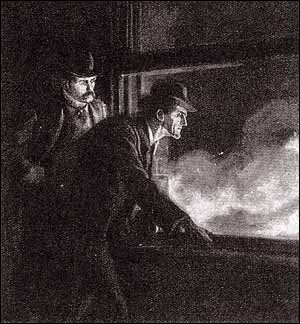
We had not long to wait. The very next train roared from the tunnel as before, but slowed in the open, and then, with a creaking of brakes, pulled up immediately beneath us. It was not four feet from the window-ledge to the roof of the carriages. Holmes softly closed the window.
“So far we are justified,” said he. “What do you think of it, Watson?”
“A masterpiece. You have never risen to a greater height.”
“I cannot agree with you there. From the moment that I conceived the idea of the body being upon the roof, which surely was not a very abstruse one, all the rest was inevitable. If it were not for the grave interests involved the affair up to this point would be insignificant. Our difficulties are still before us. But perhaps we may find something here which may help us.”
We had ascended the kitchen stair and entered the suite of rooms upon the first floor. One was a dining-room, severely furnished and containing nothing of interest. A second was a bedroom, which also drew blank. The remaining room appeared more promising, and my companion settled down to a systematic examination. It was littered with books and papers, and was evidently used as a study. Swiftly and methodically Holmes turned over the contents of drawer after drawer and cupboard after cupboard, but no gleam of success came to brighten his austere face. At the end of an hour he was no further than when he started.
“The cunning dog has covered his tracks,” said he. “He has left nothing to incriminate him. His dangerous correspondence has been destroyed or removed. This is our last chance.”
It was a small tin cash-box which stood upon the writing-desk. Holmes pried it open with his chisel. Several rolls of paper were within, covered with figures and calculations, without any note to show to what they referred. The recurring words, “water pressure” and “pressure to the square inch” suggested some possible relation to a submarine. Holmes tossed them all impatiently aside. There only remained an envelope with some small newspaper slips inside it. He shook them out on the table, and at once I saw by his eager face that his hopes had been raised.
“What’s this, Watson? Eh? What’s this? Record of a series of messages in the advertisements of a paper. Daily Telegraph agony column by the print and paper. Right-hand top corner of a page. No dates–but messages arrange themselves. This must be the first:
“Hoped to hear sooner. Terms agreed to. Write fully to address given on card.
“Pierrot.
“Next comes:
“Too complex for description. Must have full report, Stuff awaits you when goods delivered.
“Pierrot.
“Then comes:
“Matter presses. Must withdraw offer unless contract completed. Make appointment by letter. Will confirm by advertisement.
“Pierrot.
“Finally:
“Monday night after nine. Two taps. Only ourselves. Do not be so suspicious. Payment in hard cash when goods delivered.
“Pierrot.
“A fairly complete record, Watson! If we could only get at the man at the other end!” He sat lost in thought, tapping his fingers on the table. Finally he sprang to his feet.

